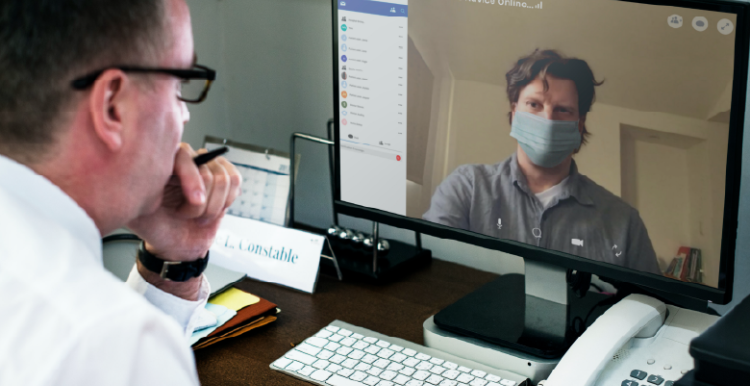The Doctor will Zoom You Now: Supporting national research to improve virtual health care

As many health care appointments are now being delivered over the phone or by video call in response to the COVID-19 pandemic, we want to make sure this new way of providing care meets peoples’ needs.
The research was a partnership project involving Healthwatch England and National Voices – both promote the value of public and patient feedback to inform positive change in health and care.
We recruited five local people to take part in the national study. The research engaged with around 50 people over the summer through an online survey, one-to-one telephone interviews and an online workshop. All participants had experienced a remote consultation during COVID-19 lockdown, either over the phone, by video-call or text. Appointments were for GP, hospital outpatient, follow-up and mental health consultations.
Using people’s experiences, Healthwatch England and National Voices created some top tips for both patients, and health and care professionals on how to get the most out of digital consultations.
The Doctor will Zoom You Now | Healthwatch England
Healthwatch Dorset Manager, Louise Bate, said: “In recent months health and social care services have had to adapt quickly to find new ways to care for people while reducing the risks of spreading COVID-19. This has led to a significant increase in appointments over the phone or online. For some people this has been a positive experience. However, remote or virtual care may not be the best solution for everyone or for all types of health and social care, and for some people it has introduced new barriers to care. By taking part in this study we have contributed a local perspective to help build understanding nationally of how to deliver good quality care virtually.
“As we head into the autumn, NHS England are seeking to raise public awareness that face-to-face medical appointments are still available alongside these remote options, and they are urging people to seek the care, support and advice they need. If Dorset residents want information and advice about accessing local services or they want to share their experiences and feedback, we are here to help and to listen."
We have also been gathering local feedback about phone and video consultations through our online survey. These findings will feed into a broader Healthwatch Dorset report about local people’s experiences of care during COVID-19, which will be published in the autumn.
Comments made by local residents about virtual health consultations
“No one seems to consider the people who do not have an internet connection.”
“Very difficult to speak to a GP and lots of e-Consult questions were irrelevant and time-consuming… as a carer who needs general advice, this was very upsetting at times.”
“I found access to my GP has improved drastically over the last few months. The phone consultations are an improvement however they are limiting. For example, my GP told me that I might have such and such a condition, but without a physical examination he could not be certain and there were no physical appointments taking place.”
“I would like to keep the video appointments, as once I’m back at work it will be much easier to have online appointments – less time off and no hassle with parking.”
“Our GP surgery have set up an eConsult service that has allowed me to access medication I need without requiring face time with the GP. The service was easy to use and the response was very quick.”
Top tips
How to get the most out of digital consultations
For patients
- Ask for a timeslot for when your remote consultation will take place.
- Let your health care provider know how you prefer to talk by phone, video or in-person.
- Find somewhere quiet and confidential and, if this isn’t possible or is tricky, make this clear when you are making your appointment.
- Start with a phone call if you are not confident with video technology.
- Ask for help if you need it and, if possible, do a practice run with a friend.
- Take time to prepare in advance, consider what you want to say and what you want to ask.
- Ask your health care provider to summarise the next steps at the end of the appointment.
- Remote consultations can be useful for routine appointments or ongoing health care.
- Not all appointments are suitable for remote consultations; say if you want to see someone in-person
For health and care professionals
- Provide a precise time window for appointments.
- Check that the person is in a confidential and safe place to have the phone or video call.
- Understand the person’s level of confidence using technology and give people a choice of how to communicate.
- Proactively check what the patient needs, clarify what is happening next and who is responsible for the next stages of care.
- Slow down the pace of the consultation, demonstrate active listening.
- Use the chat function in video calls to make the appointment more interactive, share links to information or summarise next steps.
- Do not ask people to provide information you already have access to.
- Give guidance about how the appointment will work, offer demonstrations, provide an opportunity for a test run/provide some training.
- Seek feedback about peoples’ experiences and use this to improve the service.


